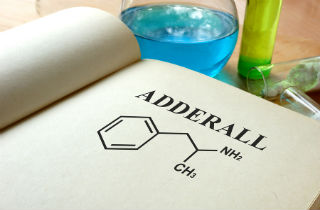Is Adderall legal in the U.S.?
Yes.
Adderall is legal when possessed with a prescription. But legally, Adderall is not a narcotic. Rather, it is a controlled medication. Adderall is addictive (addicted to Adderall symptoms) and has the potential for abuse when not used according to a doctor’s prescription. In other words, you can get high on Adderall and get into trouble! More about Adderall’s medical uses and legal status below. Plus, we invite your feedback and questions about Adderall at the end.
Adderall prescription uses
Adderall is a combination of two amphetamine medications, salts of dextroamphetamine and amphetamine. Adderall is a stimulant, used to help people suffering from narcolepsy and other sleep disorders. It’s also used to treat ADHD – in those suffering from the disorder, Adderall actually has a calming therapeutic effect. People without ADHD often take Adderall to get high or to enhance performance. The non-medical use of Adderall is illegal, which we review below.
Is Adderall a legal narcotic?
No. Adderall is not a legal narcotic. “Narcotics” typically only refer to substances that bind to the opiate receptors of the brain, producing effects similar to morphine. Legally, the term is only used to refer to opium, opium derivatives, and synthetic opium substitutes, as well as cocaine, an unrelated substance. The term “narcotic” is sometimes used to refer to any illicit drug, but this isn’t the official classification. The official classification for Adderall is a Schedule II stimulant drug. Still, it is ILLEGAL to possess or distribute Adderall without a prescription. Therefore, Adderall becomes an illicit drug when you possess it without a prescription.
Why is Adderall a Schedule II drug?
Schedule II is the second-highest classification of any controlled substance. Schedule I substances are addictive and have no accepted medical use, while Schedule II substances are accepted as therapeutic in some situations. Adderall is listed under Schedule II because of its high potential for abuse and dependence. This means that it is illegal to use without a prescription. Many narcotics are listed in this category as well.
Adderall abuse
Adderall is frequently abused for its euphoric and/or stimulant effects, particularly among college students. In fact, full-time students were twice as likely to abuse Adderall than their non-student peers. Adderall is often combined with other drugs, particularly those that depress the central nervous system. But Adderall users beware: Adderall is highly addictive, habit-forming, and potentially dangerous. Adderall sudden death cases have occurred in people with cardiovascular problems, but Adderall overdose is also a possibility.
Adderall addiction liability
Adderall is extremely addictive. Even in people who use Adderall for legitimate medical purposes, it can create a physical dependence. Overuse of Adderall can even cause heart problems or a stroke. Because of the physical dependence, quitting Adderall abruptly can cause serious withdrawal symptoms.
Should Adderall legal classification change?
Though the effects of Adderall addiction can be severe, the fact is that Adderall is a necessary and helpful medication for many people. The Schedule II classification allows those who need the drug to get a prescription, while penalizing those who sell or use it illegally. In our opinion, the current classification of Adderall is appropriate. But what do you think?
Legal Adderall questions
Do you still have questions about Adderall use? Please leave your questions about Adderall here. We do our best to answer all questions with a personal and prompt response ASAP. If your question requires, we may even create a new article to respond to your concerns. So, feel free to submit your comments, opinions, feedback and questions about Adderall here.









Related Posts